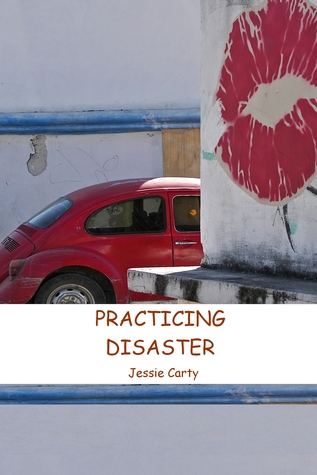Poetry Review: Practicing Disaster by Jessie Carty

Practicing Disaster by Jessie Carty
Publisher: Aldrich Books
Date Published: April 2014
“You wish you had coined the word zaftig;
that you were OK with abdomens
that hung over bikini bottoms.”
- from “Zaftig Profiling”
Practicing Disaster is collection of narrative poetry presenting an exploration of ordinary lives. These are people you could meet on the street, from the a sixteen-year-old hotel maid to a short order cook to any number of strangers you might meet on the street. For example, in “Eating at Work,” an employee travels further and further afield in search of lunchtime solitude. While in “Some Basic Consumer Math,” the owners of a Chinese restaurant tailor their food for their most loyal customers, all from the retirement home nearby, making their Sa-Cha chicken “about as mild as the contents / of a store bought spaghetti sauce.”
Some of the prose poems, in which thought condenses into thought, are among my favorites. They allow a free flow feel of the poem, different from the lined sister poems. In “I was 36″, the narrator describes her first experience getting a pedicure, remembering the same sloughing off of her grandmother’s feet. In that youthful remembering is the memory of childhood discovery and the “lesson in not going through other people’s personal affects”, and just as one can “flake off the dead skin” there is the feeling of flaking off the past.
“The Patient” also explores time passing, like the dropping of green beans into a bucket or the beeping of machines: “The doctor uses the word / aphasia / I focus on the center- / a phase / a moment.” The disjointed, jigsaw pattern of the words on the page (which I couldn’t possibly replicate here) matched the disjointed experience of a patient in the hospital, as well as the way the past jumps forward and seems to collide and become a part of the present.
In the titular poem, a women plays with the idea of disaster on her commute, imagining “overpasses from her car could spill like ink in blotchy slow motion,” and how she might shape catastrophe to set herself free. Knowing the trapped feeling of the commute, I can sympathize with the narrator, have even practiced a few of my own disasters.
Many of these poems reflect similar kinds of personal experience, even if they are outside us (as though we are people watching at a corner cafe). As a reader, there a sense of Yes, me, too; I’ve felt the same. Reading “Zaftig Profiling” (quoted at the top), I also wished I had coined the word zaftig, that I could, as mentioned later in the poem, laugh loudly in mixed company.
At first glance, what’s revealed in these poems could be described as mundane, bits of ordinary lives normally passed over or cast away as unimportant. The narrative voice of these poems, likewise, is straightforward, seemingly plain. However, this initial impression is deceiving. I’ve read through this collection twice now and have made new discoveries on each read, subtleties of voice and thought I hadn’t noticed the first go around. There are layers of humor, breaths of poignancy, beautiful discoveries.
Originally published at Andrea Blythe. You can comment here or there.